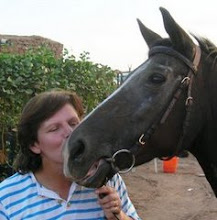Would you like to make a difference? If you support our hippotherapy program, we will be able to offer our services to more special needs children (free of charge)
Bank details
Ms A Bury.
Barclays Bank.
Guildford.
Surrey.
England.
SWIFTBIC. BARCGB22
IBAN: GB04 BARC 2035 3500 2259 24
Monday, December 7, 2015
Tuesday, April 8, 2014
Regaining confidence through the use of hippotherapy
Regaining his confidence...one step at a time. Omer unfortunately had his leg broken during a physiotherapy session with under qualified physiotherapist!! Although his leg has recovered, it is still very painful, and he has totally lost his trust in new people.
He loves 'riding' on his horse though... and is relaxing more with each hippotherapy session his attends.
He loves 'riding' on his horse though... and is relaxing more with each hippotherapy session his attends.
Monday, April 7, 2014
An explanation of the different types of horse therapy in Khartoum, Sudan...
An explanation of the different types of horse therapy...
"Hippotherapy" refers to a medical treatment strategy using the movement of the horse to promote neuro- physiological change. Occupational, physical and speech therapists use the h...orse as a treatment tool to improve posture, strength, balance, equilibrium reactions, coordination and communication. It is not a method to teach riding.
"Hippotherapy" refers to a medical treatment strategy using the movement of the horse to promote neuro- physiological change. Occupational, physical and speech therapists use the h...orse as a treatment tool to improve posture, strength, balance, equilibrium reactions, coordination and communication. It is not a method to teach riding.
The term "therapeutic riding" encompasses all aspects of using the horse with individuals who have physical and/or mental disabilities. This term is all-inclusive and may involve activities on or off the horse. The individual is taught not only specific riding skills, but also skills performed off the horse such as grooming
and tacking.
.Equine-Assisted (or Facilitated) Mental Health is an approach to treatment of various mental and behavioral disorders, such as depression, anxiety, and ADHD, using, again, a relationship with the equine as a treatment tool.
Tuesday, March 11, 2014
Benefits of hippotherapy
Why Use Horses In Therapy?
Horses create a dynamic, three-dimensional movement that cannot be reproduced in a traditional clinic setting. The natural gait or stride of the horse, coupled with the animal's warmth, provides numerous benefits, including:
Improvements in:
muscle tone and strength
gross motor skills such as sitting, standing and walking
range of motion
coordination
endurance
Advances in:
balance/equilibrium
head and trunk control
body awareness
posture
mobility
Positive effects on:
eye-hand coordination
limbic system function related to arousal, motivation and attention
sensorimotor function
oral motor control, voice quality and vocal/verbal communication
When the horse's movement is transferred to the patient through hippotherapy, it produces a combination of sensory, motor and neurological input that we use to treat a wide variety of diagnoses. These include:
Autism
Cerebral Palsy and PVL
Down Syndrome
Developmental Delay
Sensory Integrative Dysfunction
Learning or Language Disabilities
Cerebral Vascular Accident (Stroke)
Traumatic Brain Injury
Spinal Cord Injuries
Genetic Disorders
Attention Deficit
Horses create a dynamic, three-dimensional movement that cannot be reproduced in a traditional clinic setting. The natural gait or stride of the horse, coupled with the animal's warmth, provides numerous benefits, including:
Improvements in:
muscle tone and strength
gross motor skills such as sitting, standing and walking
range of motion
coordination
endurance
Advances in:
balance/equilibrium
head and trunk control
body awareness
posture
mobility
Positive effects on:
eye-hand coordination
limbic system function related to arousal, motivation and attention
sensorimotor function
oral motor control, voice quality and vocal/verbal communication
When the horse's movement is transferred to the patient through hippotherapy, it produces a combination of sensory, motor and neurological input that we use to treat a wide variety of diagnoses. These include:
Autism
Cerebral Palsy and PVL
Down Syndrome
Developmental Delay
Sensory Integrative Dysfunction
Learning or Language Disabilities
Cerebral Vascular Accident (Stroke)
Traumatic Brain Injury
Spinal Cord Injuries
Genetic Disorders
Attention Deficit
Saturday, April 16, 2011
Hippotherapy with Children from Khartoum Cheshire Home
These children attend physiotherapy sessions at Khartoum Cheshire Home, and are referred to us by there physiotherapist.
Some children have volunteers walking by thier side (sidewalkers)to interact with them,and for saftey, incase they loose their balance.

Other children need Volunteres riding with them (backriders), because the children lack balance to sit by themselves.

Some children have volunteers walking by thier side (sidewalkers)to interact with them,and for saftey, incase they loose their balance.

Other children need Volunteres riding with them (backriders), because the children lack balance to sit by themselves.

Monday, November 22, 2010
WE NEED VOLUNTEERS


Never say again " there is nothing to do in Khartoum " come along and help disabled children "ride high" in Sudan.
As many as 2 or 3 volunteers may be needed for each rider. Volunteers with horse experience are needed to lead the horses and double as backriders, those with little or no horse experience can be trained as side walkers.
Our riding therapy program depends almost entirely on volunteer help. We need volunteers to help in every aspect from grooming the horses to fund-raising.
Contact:- Jane-anne on 0918215592
Subscribe to:
Posts (Atom)



.JPG)



